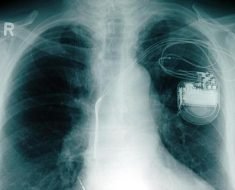Patients with colorectal cancer (CRC) who are also obese have a poorer survival than those who are not obese. A new study suggests that they may be receiving a lower cumulative dose of adjuvant chemotherapy, and that this potential “under treatment” could be the explanation for the worse outcomes.
The findings were presented by a UK team at the ESMO World Congress on Gastrointestinal Cancer 2021 on July 2.
The team analyzed data for more than 7000 patients with colorectal cancer from four randomized controlled trials.
They found that the cumulative dose, but not the relative dose intensity, of adjuvant chemotherapy affects survival outcomes.
In addition, the team showed that each 5 kg/m2 increase in body mass index (BMI) led to an approximately 1% reduction in both the dose intensity and cumulative dose of adjuvant chemotherapy.
“These modest reductions would equate to approximately a 4% to 5% reduction in both dose intensity and cumulative dose if we compare a normal BMI with a morbidly obese BMI,” noted lead author Corinna Slawinski, MD, PhD, clinical research fellow from the Division of Cancer Sciences, University of Manchester, UK.
Adjuvant chemotherapy is “dosed according to a person’s body surface area, which is calculated from their height and weight,” she explained. “But in obese patients…doses are often capped, or based on an idealized weight, because of concern that large doses might increase side effects.”
“This means that obese patients may receive proportionately lower doses of chemotherapy,” she said.
The findings support the “recently published ASCO guidance that full, weight-based chemotherapy doses should be used to treat obese adult patients,” she commented.
“Adjuvant chemotherapy has the potential to cure patients with residual micrometastatic disease following curative surgery, so it is important that we maximize the benefits for all patients,” said Elizabeth Smyth, MD, consultant in gastrointestinal oncology at Addenbrooke’s Hospital in Cambridge, UK, commenting for ESMO.
However, “dosing chemotherapy is complex,” she continued, and it “includes not only weight but also fitness, comorbidities including renal function, and dihydropyrimidine dehydrogenase testing results.”
“Prospective studies examining the impact of higher doses of chemotherapy may be needed, especially as there is an increase in the proportion of patients diagnosed with cancer who are obese.”
“We should take all aspects of the patient into account when making chemotherapy dosing decisions,” she added. “Dose reductions do seem to be associated with less good survival in this study, but these may still be required for safety.”
Details of the Analysis
For the analysis, the team studied individual participant-level data from the MOSAIC, SCOT, PROCTOR-SCRIPT, and CHRONICLE randomized trials from the OCTOPUS consortium.
All of the trials included patients with localized colon or rectal cancers who had undergone curative resection followed by adjuvant chemotherapy and had at least one derivable BMI measure at trial entry.
For each patient, the team determined the BMI and body surface area, as well as the average relative dose intensity (ARDI) and average cumulative relative dose (ACRD) of adjuvant chemotherapy, calculating the percentage of actual-to-expected doses.
The team found 7870 patients from across the four trials, with complete data available for 7271. Most patients were from the SCOT trial (n = 5945).
The median age of patients ranged from 60 to 65 years, and the median BMI ranged from 24.5 to 26.5 kg/m2. The proportion of patients with obesity was higher in the SCOT trial, at approximately 22%, compared with 5%-12% in the other trials.
SCOT is a more recent trial than the others, and so “might reflect not only population changes but also changes in recruitment practices for obese patients,” as it matches more closely the current UK population prevalence of obesity, Slawinski said in her presentation.
The analysis showed that increases in the cumulative dose were associated with improved survival: 5% increments of the ACRD were associated with significant improvements in disease-free survival (hazard ratio [HR], 0.953; P = .001), overall survival (HR, 0.931; P < .001), and cancer-specific survival (HR, 0.941; P < .001).
However, increases in the relative dose intensity were not associated with significant improvements in survival outcomes.
Discussing the findings, Harpreet S. Wasan, MD, Hammersmith Hospital, Imperial College London, UK, pointed out that the relationship between obesity and cancer is “complex.”
“Not only is it causative,” he continued, “but the impact of obesity on noncancer comorbidities may be very important in terms of survival in our cancer patients.”
“We also have to look at chemotherapy effects, as we normally measure chemotherapy as body surface area,” yet “most data in obesity” refer to BMI.
Moreover, the impact of elevated BMI on cancer outcomes may not apply to all cancer types, such as in lung and renal cancers.
Turning to the current results, Wasan said that the findings are “novel” and address an “unmet need.”
The implication is that “undertreatment” in patients with obesity may “at least partially explain” some of the poorer survival outcomes that have been observed.
However, there are “many” potential confounders, including over-representation of the SCOT trial, which may generate bias, and that patient compliance with oral capecitabine was not recorded.
Other potential confounders include that there were relatively high numbers of early deaths in the dataset, and “we should probably exclude” them as their relationship to dosing is unclear.
Ethnicity and the prevalence of insulin resistance need to be examined, Wasan said, and “there are variations in toxicity management,” including for neuropathy, “which the authors say they will look into in more detail.”
The work was supported by Cancer Research UK via funding to the Cancer Research UK Manchester Institute. Renehan is supported by the NIHR Manchester Biomedical Research Centre. No relevant financial relationships were declared.
WCGC 2021. Presented July 2, 2021. Abstract O-4.
For more from Medscape Oncology, join us on Twitter and Facebook.
Source: Read Full Article





